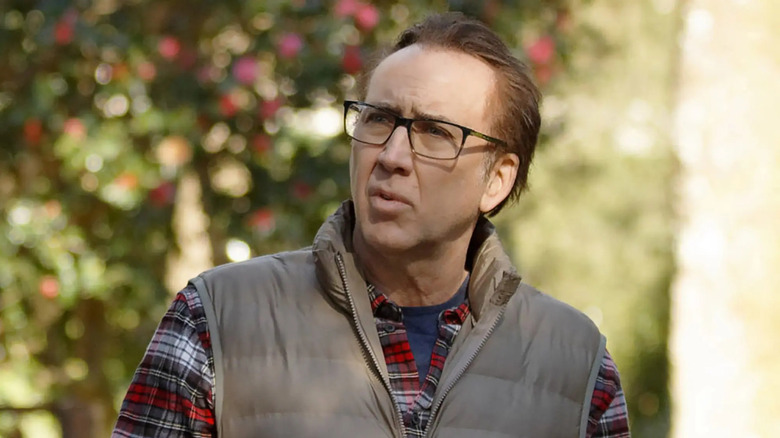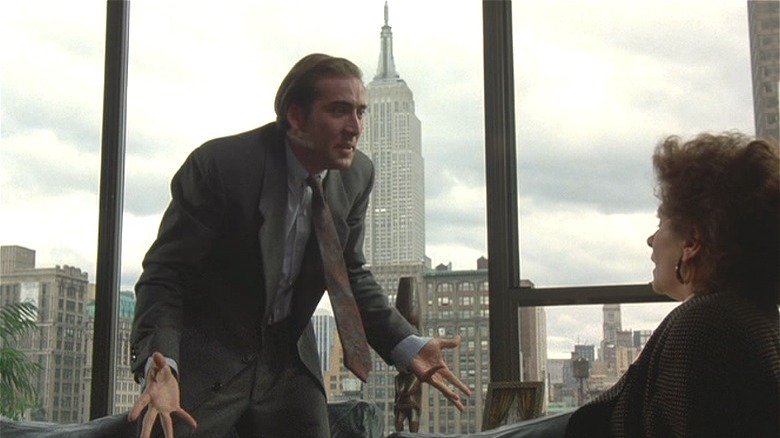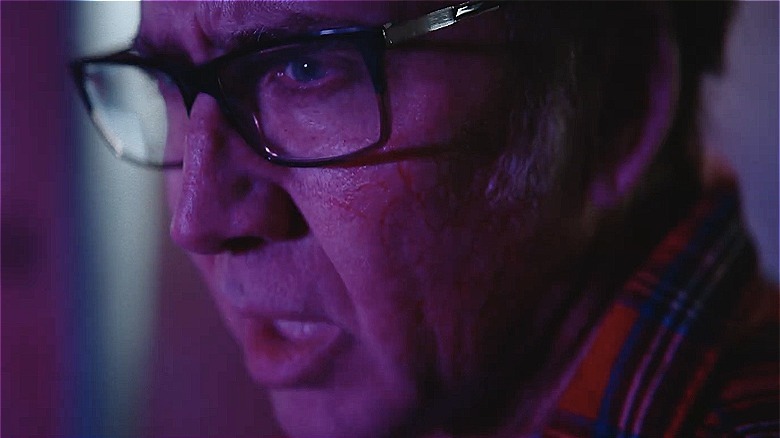Color Out Of Space Was A Redux Of One Of Nicolas Cage's Weirdest Roles
Nicolas Cage is the kind of actor who can make oddball roles of any variety work in his favor. Over the course of his long and eventful career, Cage has had several meme-worthy moments, which are almost always endearingly hilarious. Take the "How'd it get burned?!!" scene from 2006's "The Wicker Man" as an example — the scene stands out due to Cage's manic delivery of the line in an otherwise underwhelming folk horror remake. However, Cage's ability to take on complex roles and imbue them with dark humor is on full display in films like "Mandy" and "Wild At Heart," and this ability reaches its peak in the critically-acclaimed culinary drama, "Pig."
So, when Richard Stanley conceived the idea of a harrowing Lovecraftian cosmic horror movie about a family hounded by an imperceptible alien species, Cage emerged as the natural choice to play the family patriarch, Nathan Gardner. Stanley's "Color Out Of Space" centers on the Gardner family, who cling on to the idea of a sustainable utopia after moving into an isolated farmhouse, but their lives are overturned after a meteorite crashes straight into their backyard. While Stanley's film is an engrossing look into the unknown, it is Cage's rendition of Nathan that heightens the taut drama of a family driven to the brink of madness.
But, what was the inspiration behind Nathan Gardner's out-of-touch eccentricity in the face of a cosmic threat? According to Stanley, Cage's performance in "Color Out Of Space" was heavily drawn from one of his most unhinged roles on screen: the character of Peter Loew in "Vampire's Kiss." Yes, the one in which Cage's Loew believes that he is allergic to sunlight and is turning into a vampire while running through the streets of New York in a crazed display of madness.
'I never misfile anything. Not once, not one time'
In an interview with Screen Anarchy, Stanley explained that as Cage was "a huge Lovecraft fan," the production company behind "Color Out of Space," SpectreVision, hooked him up with Stanley's script. The characterization of Nathan Gardner, who goes from a level-headed, practical patriarch to an incensed, tortured man who wants to euthanize his own family, owes a lot to Cage's approach to the role. Stanley claims that Cage based a lot of Nathan's character on his own father, August Coppola, something he had already done before in "Vampire's Kiss." The director said:
"When Nic puts on this strange, whiny, almost British accent, he's imitating his dad, who's the same person he was parodying in Vampire's Kiss. It's very much a turn to his Auggie [August Coppola] characterization from Vampire's Kiss."
Cage's drawling, whiny way of speaking in "Vampire's Kiss" adds greatly to his character in the 1988 black comedy horror film. A good example would be this scene, in which Loew lectures his therapist about the simplicity of filing documents in alphabetical order. The hilarity of the scene aside, it establishes the outlandish nature of Cage's character, highlighting his narcissistic tendencies and penchant for theatrics. As Leow becomes more isolated and irritated as the film progresses, it makes sense for him to lean heavily into his delusions that he is a vampire on the prowl. Per Stanley's statement above, Cage parodied his father's mannerisms in "Vampire's Kiss" — something he turned to once again while portraying a family man on the edge of sanity.
Injecting a parodied performance with substance
What's interesting about Cage applying his "Vampire's Kiss" mannerisms to "Color" is the wildly disparate effects the same approach has on the two characters. On the one hand, the exaggerated mannerisms in "Vampire's Kiss" perfectly capture the film's tone, which is an extremely dark comedy about a man spiraling into unflinching madness. Leow is driven by corporate greed and hedonism but is not honest enough to confront himself with the hollow nature of his existence. As a result, Leow resorts to fantastical delusions of being an apex predator and begs for death in the end.
On the other hand, Cage's parodied mannerisms in "Color Out Of Space" paint a completely different picture. As the film begins, Nathan Gardner is simply a man with a utopian vision, who wishes to escape the injustices of the world by rearing his own animals and growing his own crops for his family. When the "color" permeates the farm, Nathan's behavior becomes uncharacteristically deranged, leading him to put on a different accent as he goes about grappling with the unknowable. The "color" affects Nathan more than anyone else, leading to moments that are humorous in a bleak, existential way. There's pathos in Cage's portrayal of Nathan as well, as it also highlights the themes of childhood trauma and the fear of losing loved ones in the face of inevitable cosmic threats.
Thus, while Cage's role in "Vampire's Kiss" adds a sense of heightened, crazed fantasy to a darkly comic storyline, his approach in "Color Out of Space" grounds and humanizes the plight of the Gardner family in the face of terror. Amid all the memes and hilarity, there's substance to Cage's performance in both films, actualized in a way that can only be done by Nicolas Cage alone.


